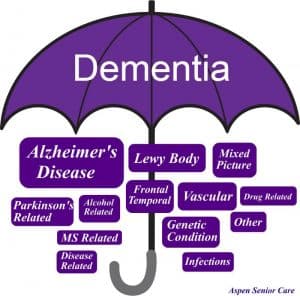I’ve been trying to understand the difference between Dementia and Alzheimer’s for a long time. Someone sent me this graph that I found very interesting:
So, apparently, Dementia is the umbrella for many different cognitive disorders. My dad was diagnosed with Alzheimer’s Disease about 10 years ago.
The decline was very gradual. It started with him forgetting things, like his keys or his mobile phone. Then, he started to repeat himself over and over again. Then, he would say inappropriate things.
This went on for years. I think his girlfriend helped to shelter him and keep him in check. But then she died. That’s when he started to go downhill at a rapid pace. Now, he can’t walk and can barely talk.
According to the Alzheimer’s Association repetition is common in individuals diagnosed with Alzheimer’s or dementia, oftentimes in association with a person’s desire to seek comfort or security.
When I went to the Alzheimer’s website, they define Alzheimer’s into three stages (this was taken directly from their website):
First stage:
- Coming up with the right word or name.
- Remembering names when introduced to new people.
- Having difficulty performing tasks in social or work settings.
- Forgetting material that was just read.
- Losing or misplacing a valuable object.
- Experiencing increased trouble with planning or organizing.
Second stage:
- Being forgetful of events or personal history.
- Feeling moody or withdrawn, especially in socially or mentally challenging situations.
- Being unable to recall information about themselves like their address or telephone number, and the high school or college they attended.
- Experiencing confusion about where they are or what day it is.
- Requiring help choosing proper clothing for the season or the occasion.
- Having trouble controlling their bladder and bowels.
- Experiencing changes in sleep patterns, such as sleeping during the day and becoming restless at night.
- Showing an increased tendency to wander and become lost.
- Demonstrating personality and behavioral changes, including suspiciousness and delusions or compulsive, repetitive behavior like hand-wringing or tissue shredding.
Last stage:
- Require around-the-clock assistance with daily personal care.
- Lose awareness of recent experiences as well as of their surroundings.
- Experience changes in physical abilities, including walking, sitting, and, eventually, swallowing
- Have difficulty communicating.
- Become vulnerable to infections, especially pneumonia.
Now Dementia on the other hand has several different stages including the following (taken from Medicine Net website):
Stage 1 (No cognitive decline)
The imaging techniques such as computed tomography (CT) scan of the brain might show some changes but the person does not exhibit any of the cognitive signs and symptoms.
Stage 2 (Very mild cognitive decline)
- The person starts forgetting words or misplacing objects; this may go unnoticed by people around them.
- It should be remembered that this stage might also occur due to the normal aging process.
Stage 3 (Mild cognitive decline)
- The person suffers from short-term memory loss—forgetting what they just read and the names of new acquaintances.
- They can’t make plans or organize things as earlier.
- They might frequently start misplacing and losing things.
Stage 4 (Moderate cognitive decline)
- The person starts to lose interest in the things that they used to enjoy and avoids meeting people and, attending social events.
- Calculating simple expenses and adding up the financial bills becomes difficult.
- They become disoriented to time and place—they forget or figure out the present time, date, and place
- The signs and symptoms of cognitive decline become clear to everyone around the patient.
- Clinical diagnosis of dementia is most likely to be made at this stage.
Stage 5 (Moderately severe cognitive decline)
- The person experiences major memory disturbances such as forgetting their phone number and address.
- They may forget how to bathe and face trouble while choosing and wearing clothes.
Stage 6 (Severe cognitive decline):
- The person loses his memory as much as that they fail to remember the names of closed ones and might mistake one person for another.
- They suffer from severe confusion and anxiety.
- As dementia worsens, they might need help to go to the bathroom.
Stage 7 (Very severe cognitive decline):
- This is the final stage or end-stage of dementia.
- The patient becomes completely dependent on other patients to carry even basic activities like eating, drinking, walking, and sitting.
- There is a loss of bladder and bowel control.
- Their ability to communicate is hampered drastically as they speak too little struggling with words.
It should be noted that the speed of progression through the stages of Alzheimer’s disease differs amongst people. Not all aging people will experience the same changes at each stage and the cognitive decline that occurs may overlap stages.
—-
I would like to invite you to attend or share with a family member the Russo Law Group’s Virtual Caregiver’s Support Group on September 9th at 12 pm. I attended the group in the past and found it benefical. It is now virtual.
The group meets monthly and we welcome caregivers, families, and friends of those with Alzheimer’s/Dementia to join and share experiences, feelings, and information. The overall goal of a support group is to provide guidance and assist in meeting the needs of the group. It lends support and education among peers and provides referrals to individuals connecting them to people and resources within the community. We have speakers who will present on various topics affecting both the caregivers and their loved ones.
Here is the link to the event: https://www.vjrussolaw.com/event/caregivers-support-group-alzheimers-and-dementia/2021-09-09/ Any questions, please call Janet at (516) 393-3141 or email at [email protected]


